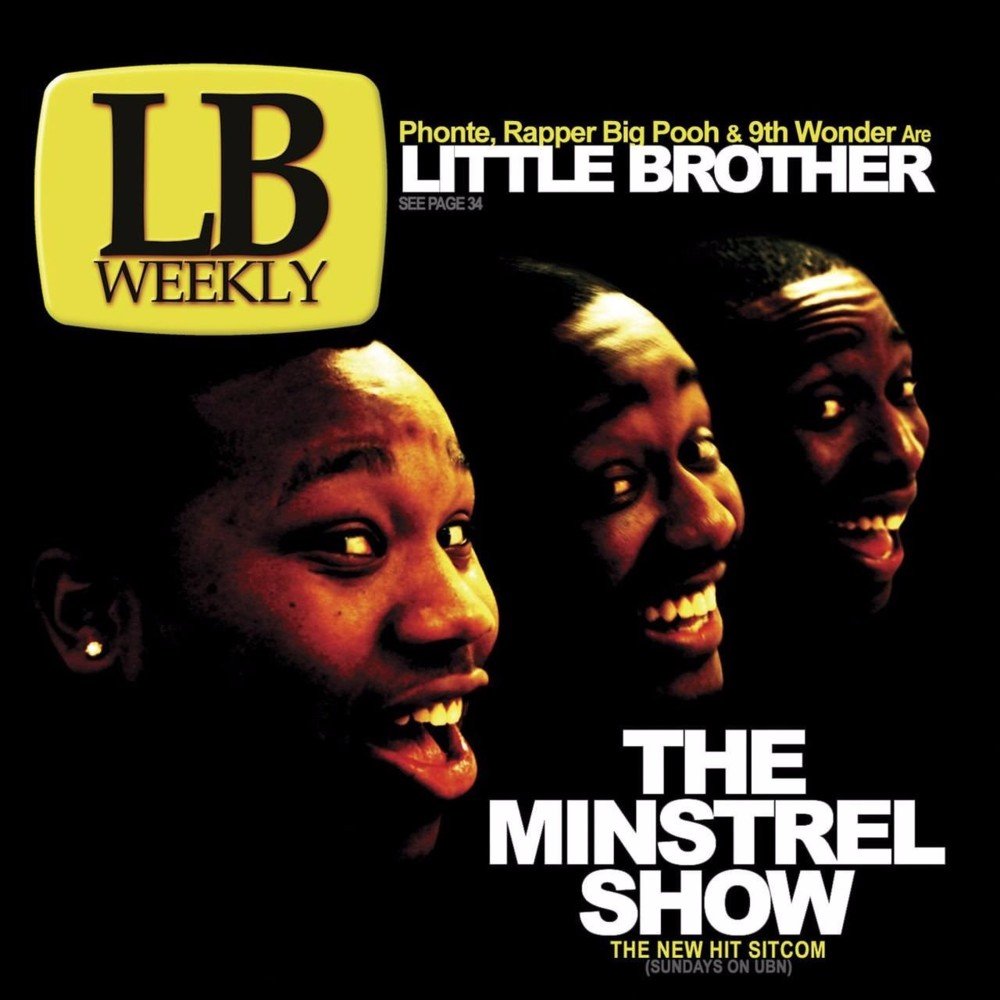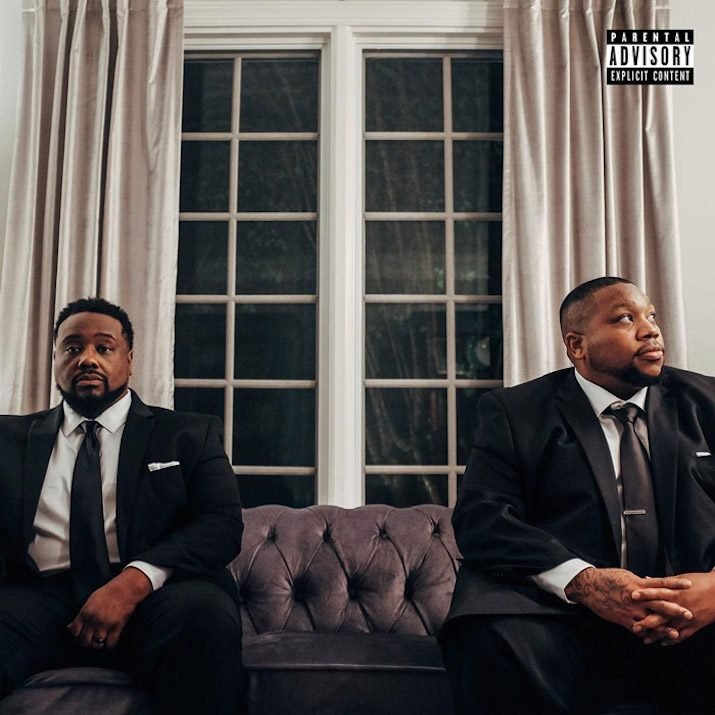Happy 20th Anniversary to Little Brother’s debut album The Listening, originally released February 25, 2003.
If you were born after March 9, 1997, the day The Notorious B.I.G. died, you’re old enough to rent a car. You are also old enough to be three or so albums deep into your rap career. Even though the genre is celebrating its 50th anniversary, rap is still considered a young person’s game, so the idea of 20-year-old aspiring emcees whose favorite albums are by Kendrick Lamar or Nicki Minaj or Wiz Khalifa is not far-fetched. In 2023, “albums influenced by To Pimp a Butterfly (2015)” is practically a genre unto itself.
Members of Little Brother were still in their teens when B.I.G. passed, but by that time they’d grown up in a musical world where hip-hop was already a cultural force. It was changing the way music and popular culture was being made, consumed, and marketed. They’d absorbed lessons from some of the best that the music had to offer at the time, which shaped the way they perceived the world.
Little Brother were some of the first adult children of hip-hop to make music available to be consumed by listeners worldwide. The members of the North Carolina-based group were all grown men when their debut album, The Listening was released 20 years ago. The slightly left-of-center material by artists like A Tribe Called Quest, De La Soul, and Pete Rock & C.L. Smooth had forged the sensibilities of emcees Phonte Coleman a.k.a. Phonte and Thomas “Rapper Big Pooh” Jones, along with producer Patrick “9th Wonder” Douthit.
Little Brother used the inspiration of these groups to create something that honored their influences, but was still great on its own merits. The Listening, like many debut albums, is an attempt at a definitive artistic statement for their introduction to the hip-hop audience. It’s a dedication to the type of hip-hop they loved and a journal of their own lives through the recording of the album.
Little Brother pump their whole soul into the album. Clocking in at a little over 65 minutes, it’s a sprawling and ambitious 18-track undertaking. The framing device for the album is that it’s a continuous broadcast of WJLR (aka Justus League Radio), complete with DJ interludes, call-in requests, and commercials. Little Brother unloads a pretty serious salvo here, covering many topics, interjecting humor and introspection, and introducing many of the members of their extended Justus League crew.
Phonte and Big Pooh excelled as the lyrical end of the group. Phonte is one of the best emcees to debut after 2000. He is an expert at putting together phrases while utilizing a shifting, at times conversational flow. He has a magnetic presence on the mic and exudes natural humor. He’s also probably the best rapper/singer ever. Big Pooh doesn’t get as much shine, but he’s also highly skilled. He can expertly change his delivery at the drop of a dime, and is able to craft lyrics more clever than most.
Nearly all of The Listening was produced by 9th Wonder. Unlike many of the “hot” producers in the mainstream, he created sample-based materials, chopping soul and jazz records to create a mellow, melodious, and moving sound. He also made at the time for using the FruityLoops software to create his beats. This contrasted with the approach of many “traditional” hip-hop producers, who still used drum machines or keyboard-based samplers.
Listen to the Album:
The idea of using a PC-based software for production purposes was a controversial one, but 9th Wonder used it to the maximum of its ability. Sampling soul tracks wouldn’t really became en vogue again until Kanye West dropped The College Dropout in 2004, but here 9th Wonder proved himself ahead of the curve. His musical backdrop is an essential part of setting the mood of the album.
Little Brother tackles everything from love to loss to simply being dope throughout The Listening. Some of the album’s best moments involve the latter. Phonte and Big Pooh show their emcee skills on “For You,” where the two trade rough rhymes over an expertly chopped sample of Melba Moore’s “We’re Living to Give Each Other.” Phonte shines particularly bright on the track, as he raps, “Was looking for n***as that could wreck flaws / And rhyme for they personal pleasure ’til four in the morning / With my back and my chest sore and never have to press pause / ‘Til I stop the tape and hit em with a yes y’all.” Later he declares that “I tell n***as, ‘Y’all ain't wack, y’all just sound wack rhyming after me.”
Both Pooh and Phonte get their individual chances to shine on the album. “Groupie Pt. 2,” the album’s upbeat opening track, is Pooh’s salvo against those who talked trash about him early on, but are now trying to be his best friend once he signed a record deal. “Nighttime Maneuvers,” Phonte’s solo cut, is a more musically subdued endeavor. He again demonstrates his substantial lyrical skills as he raps, “I put my name on the map through dismantling / Embarrassing arrogant cats and battle 'em because they raps ain’t astonishing / Got n***as in the club spitting out they Heinekens / Like, "God damn it, when that n***a Tay gonna rhyme again?"
Little Brother display their unique sense of humor throughout The Listening. Phonte in particular is a genuinely funny guy, as he reinforces on his verse on “The Yo-Yo,” where he punctures the hypocrisy of people who try to act more righteous than he is. He hilariously expresses, “So what's the reason for the hating? / N***as with dreads calling they self gods, with white girls named Caitlin / And I’m cool with interracial dating / But I ain’t about to hear no fucking speeches cause I wanna have some bacon.”
“The Get Up” is one of the few songs on The Listening not produced by 9th Wonder. This time the Justus League affiliate Eccentric works behind the board, contributing a keyboard heavy track that’s distinctive, but also fits easily into the album’s vibe. Phonte and Big Pooh describe their drive to make it in the hip-hop industry, earn worldwide respect, and silence their naysayers. Phonte raps, “My rap style, n***as take to it / Me and Pooh sick of eatin’ noodles, this year we fitna to add a steak to it / And wild out with our hands in the air now / And smack these funny n***as giving us the stare down.”
There’s also a strong current of frustration that runs through The Listening. Some of the album’s best moments come from the group’s explorations of the aggravation and loneliness that pursuing the dream of creating music can breed. One such song is “Speed,” where both Phonte and Big Pooh reflect on how attempting to explore a musical career while still taking care of your business can be an overwhelming experience.
Phonte describes how the cycle of going from working a full time job at a call-center to heading directly to the studio afterwards make him feel like “I’m share cropping in the paper chase.” He declares “this treadmill lifestyle ain’t working for me / It’s from your crib to the lab to your job to make a profit / And at the days end you still got nothing accomplished.” Meanwhile, Pooh finds himself ground down by endless days and nights of touring and driving along endless highways, and how he finds that he’s going “from first gear to fifth gear, out of control again.”
The effects that touring can have on your “normal” life is the subject of Phonte’s verse on “Away From Me.” He regrets how the long stretches of time on the road have separated him from his son, preventing him from watching his firstborn grow. Over a sped-up and chopped sample of Mass Production’s “Galaxy,” Phonte laments, “That shit is killing me dude, I pray that your eyes remember me.”
Enjoying this article? Click/tap on the album covers to explore more about Little Brother:
With his verse Big Pooh dictates a message to his older brother. He hints at a deep a rift between the two, possibly over money, as he raps, “I know it hit you hard when your boys hit you / And your letters, I never answered back to / Even though life keep me racing like a track dude / I bailed out in your time of need / But you fucked me over in your time of greed / We from the same womb, what happened to the creed?”
Little Brother ends the album with the title track, a meditation on consumers only listening and appreciating the fruits of their labor only on the surface level. On top of the haunting, echoing, atmospheric track, Big Pooh and Phonte decry the lack of respect that the audience members give well-thought out and constructed music, and encourage their fans to dig deeper.
To underscore their point, both emcees spend each of their first verses explaining the central role that music plays in their lives. Big Pooh starts of the song by rapping, “Yo, I bought a brand new album today / Decide to take it home, kick off my shoes, relax and play / And spin it for the whole joint cause I like to get the whole point / Music is everything to me.” Phonte later describes how music provided solace to him in a tumultuous home atmosphere, rapping, “Music was my sanctuary so I take a long listen / To hip-hop, living out my life in songs wishing / My parents, I could get along with them / So I would go inside my room and dig deep inside the strong rhythms.”
For the third verse, Pooh and Phonte go for line for line, mimicking the all-style, no substance approach to rapping. Their rhymes degenerate into nonsense, as they extol the virtues of “Fly Motorola diploma style ice n***as” and encourage the audience to “Check all these bitches on my Soul Glow city / Walking round with Madagascar titties.” Eventually they stop the track and give up in disbelief because “n***as don't give a fuck about no lyrics no more.”
Though The Listening may not have been the most financially successful album at the time, it was praised by critics and lauded by the very artists that the members of Little Brother idolized. Though the group would go on to refine their style and musical approach, it remains one of the best debut albums ever released by a hip-hop group. And, truthfully, the project influenced the musical careers of some hip-hop’s current stars. Drake has said that he’s a big fan, and in a 2021 Instagram Live chat, Doja Cat famously lauded the group, listing Phonte’s verse on “Whatever You Say” as one of her all-time favorites.
While I may be incredulous at the idea of a generation of rappers that grew up on Post Malone now making music, they can take some solace in knowing that eventually some of these aspiring emcees grew up with The Listening. They are influenced by its originality and transcendence, and they will hopefully use that inspiration to create something original and transcendent on their own.
LISTEN:
Editor's note: this anniversary tribute was originally published in 2018 and has since been edited for accuracy and timeliness.



